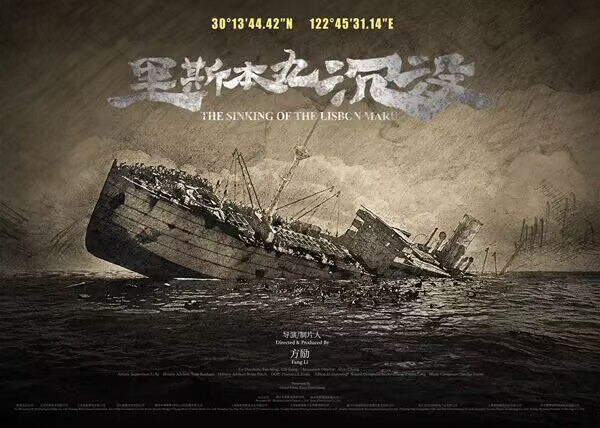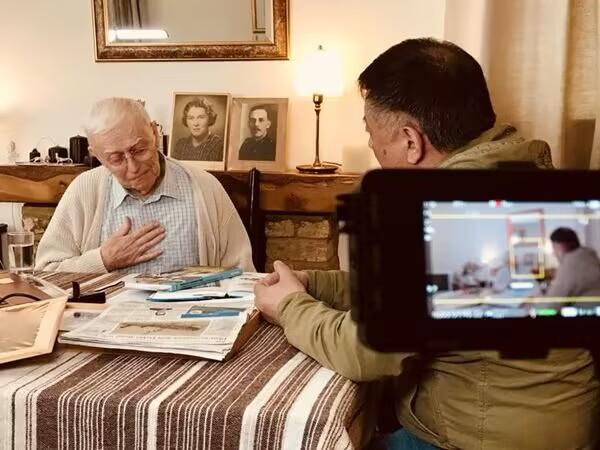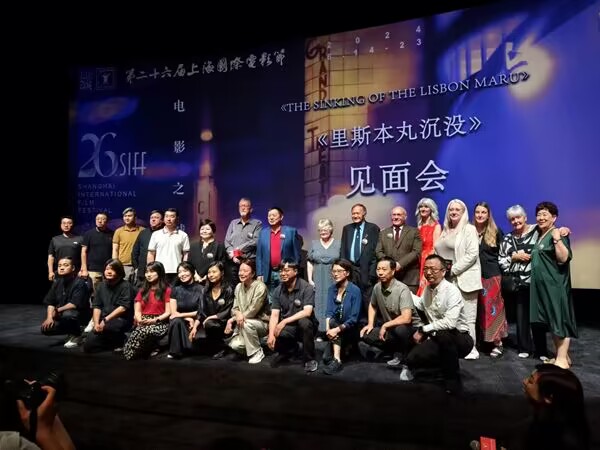
 0 Comment(s)
0 Comment(s) Print
Print E-mail China.org.cn, June 21, 2024
E-mail China.org.cn, June 21, 2024
A local boatman's tale of a sunken ship near the Dongji Islands in Zhoushan, eastern China's Zhejiang province, captured the attention of producer Fang Li during a film shoot in 2013, setting him on an eight-year odyssey to uncover the vessel's lost history.
Fang was on location with writer-turned-director Han Han, who was filming "The Continent" when the chance encounter with the boatman occurred, sparking Fang's interest in the mysterious shipwreck.

Producer and director Fang Li speaks at the premiere of "The Sinking of the Lisbon Maru" during the 26th Shanghai International Film Festival in Shanghai, June 14, 2024. [Photo/China.org.cn]
The result of Fang's arduous journey was recently presented to the world. "The Sinking of the Lisbon Maru," a 123-minute film, premiered on June 14 as the first film to open during the 26th Shanghai International Film Festival, leaving the audience both in tears and applauding. The film was the fastest to sell out at the festival.
"We not only finished a film but also guarded a history," said Fang, a veteran film producer who served as director for the first time in this project. "This cruel historical event has been buried under the sea and denied by the Japanese military for 82 years, and I hope that together we can share it with the world."
The Lisbon Maru was an armed Japanese cargo ship carrying 1,816 British prisoners of war (POWs) from the Battle of Hong Kong in 1941. In October 1942, while en route to Japan without a sign indicating POWs onboard, violating the Geneva Conventions, the ship was torpedoed by a U.S. submarine. As the ship sank off the Dongji Islands, Japanese soldiers locked the prisoners below deck or shot at them, leading to the deaths of 828. Despite the danger, 255 local Chinese fishermen nearby risked their lives to rescue 384 British prisoners amid gunfire.

A poster for "The Sinking of the Lisbon Maru." [Image courtesy of Laurel Films]
"After James Cameron made 'Titanic,' everybody knew about it. The death toll of the Lisbon Maru is more than half that of Titanic, yet few know about it," Fang said. "Plus, the POWs on board were massacred and abused. We must tell the world that this happened on our country's land. Our fishermen, our older generation, were witnesses, participants, and rescuers. Thus, making this film is something that only Chinese can do."
Fang, an expert in geophysical exploration and marine technology, led professional teams to search for the sunken ship in 2016 and 2017. They eventually located it on the seabed, 36 kilometers away from an incorrect historical coordinate.
Fang and his team also traveled worldwide to locate related historical documents and the POWs aboard the ship, along with their families. In 2018, Fang spent £250,000 ($317,000) on advertisements in three major U.K. newspapers to find British POWs and their descendants from the Lisbon Maru incident. They established contacts with about 380 families and interviewed nearly 120 descendants in China, the U.K., the U.S., Canada, and Japan.
Unfortunately, only two POWs and one Chinese fisherman involved in the rescue were found alive at the time of the film's production. These men shared their firsthand experiences in the documentary, providing invaluable perspectives. Sadly, all the three passed away in the years before the film's release.

Producer and director Fang Li interviews Ron Brooks, who was 83 at the time, reading the last letter his father sent to his mother before he perished on the Lisbon Maru. It says, "We will be together again soon." [Photo courtesy of Laurel Films]
Despite financial difficulties, which forced Fang to max out five credit cards and sell all his houses, he never gave up on the production of the documentary. "We have to rescue this piece of history as fast as possible before it's too late," he said.
The premiere was also attended by family members of British soldiers who survived or lost their lives in the Lisbon Maru incident. They praised the heroism of the Chinese fishermen and the legacy they left through their humanity and bravery. Following the premiere event, the relatives of the POWs left Shanghai for Zhoushan to mourn the British soldiers resting there. On the ship, Jean Clements and Kathleen Birch, niece and cousin of POW Kenneth Hodkinson, took a small gravestone with them to bury at sea.
Tony Banham, the film's history consultant and one of the early researchers of the Lisbon Maru incident, greatly aided the filmmaking process. His book, "The Sinking of The Lisbon Maru: Britain's Forgotten Wartime Tragedy," originally published in 2006, served as a valuable reference.
"I would have never dreamed that for me, this journey would take me to Shanghai 20 years later, not just by myself, but as a part of something so much bigger," Banham said as he attended the premiere. "It is one of the most emotionally draining documentaries I've seen."

Creators, guests and families of Lisbon Maru prisoners of war pose for a group photo at the premiere of "The Sinking of the Lisbon Maru" during the 26th Shanghai International Film Festival in Shanghai, June 14, 2024. [Photo/China.org.cn]
"Now I have fulfilled a commitment in my heart," Fang concluded. "No matter how much money or time the film took, what matters to me is the hope and expectations of over 2,000 families. More than 1,800 families of POWs hope to see the experiences of their ancestors; over 200 families of fishermen from Zhoushan hope that their ancestors' good deeds and heroic acts will be remembered."
"This is the most important thing I have ever done in my life," he added.
Go to Forum >>0 Comment(s)